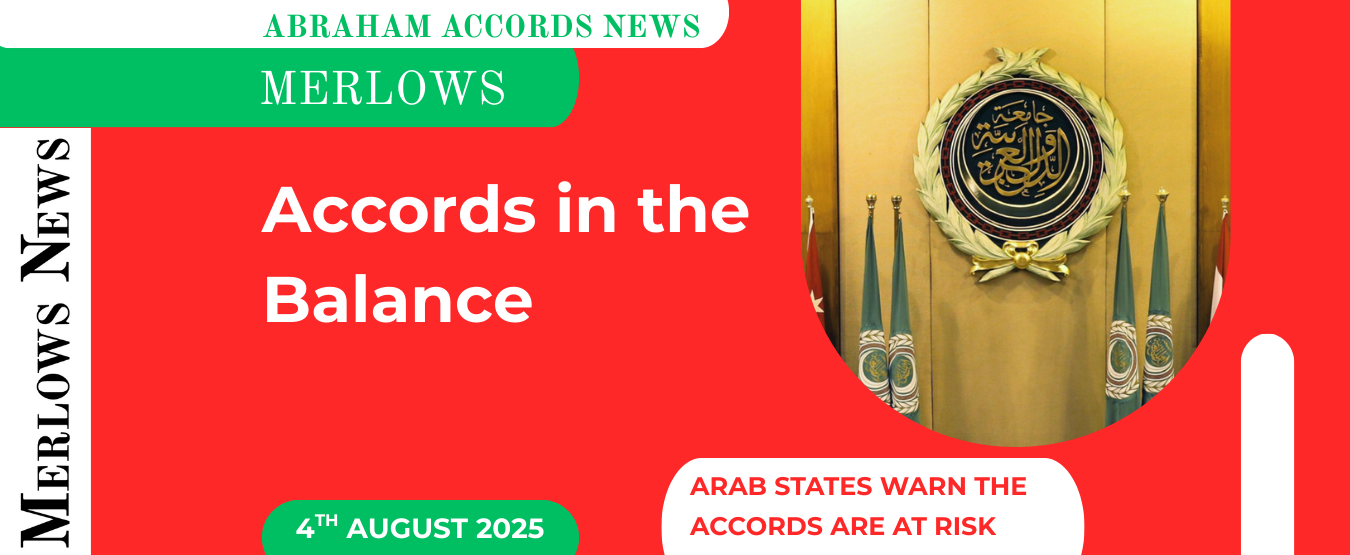After Israel’s latest military operations, Arab states warn that the Abraham Accords are in jeopardy. The warnings reveal the fragility of peace built on trade and trust—and the hypocrisy of regimes who quietly rely on Israel for security.
In a Nutshell
On 15 September 2025, multiple Arab states issued sharp warnings that Israel’s military actions in Gaza and beyond risk “endangering regional peace” and could derail ongoing ceasefire talks. The UAE, Bahrain, and Jordan raised concerns at the Arab League, while Saudi Arabia hinted that its own normalization talks are on ice.
The timing is significant. Just weeks earlier, the Doha strike on Hamas leaders had already unsettled regional capitals. Now, Arab officials are leveraging diplomatic outrage to remind Israel that trade and cooperation under the Abraham Accords are conditional. Yet beneath the rhetoric lies contradiction: these same states quietly depend on Israel’s intelligence, technology, and defense exports to keep their regimes safe from Iran, Houthis, and domestic unrest.
Sources: Just the News, 15 Sept 2025, Reuters, 16 Sept 2025
The Main Course
What Arab States Said
The UAE warned that Israel’s operations were “pushing the region towards a dangerous spiral.”
Bahrain said “trust is at breaking point.”
Jordan condemned the actions outright, citing “destabilisation.”
Saudi Arabia quietly told Washington that normalization is “on hold.”
The Arab League framed this as a collective stand against Israel’s aggression. Headlines quickly declared the Abraham Accords “at risk.”
Why Now?
The warnings were not simply about Gaza. They were about optics. Arab leaders face populations radicalized by years of propaganda against Israel. To be seen as silent or worse, supportive of Israel’s actions is political suicide. Thus, denunciation becomes survival.
But timing also matters. Trump’s return to the diplomatic stage with ultimatums to Hamas has unsettled Arab capitals. They fear being sidelined in a peace process led by Washington and Jerusalem, not Cairo or Riyadh. By threatening the Accords, they seek leverage.
The Quiet Dependence
Despite the rhetoric, reality is stark: these states rely on Israel.
Defense Exports: In 2024, Israel signed multi-billion-dollar defense deals with Morocco and the UAE, including drones, cyber defense, and missile systems.
Intelligence Sharing: Israel provides intelligence on Iran’s Revolutionary Guard, Hezbollah, and Houthi operations—threats that Arab states cannot counter alone.
Technology and Agriculture: Israeli water and agri-tech innovations sustain Gulf economies desperate to diversify beyond oil.
To threaten Israel while relying on its security umbrella is hypocrisy at scale.
Accords Under Pressure, Not Broken
The Abraham Accords have survived worse. After the May 2021 Gaza war, after flare-ups on the Temple Mount, after drone attacks in the Red Sea, cooperation endured. Why? Because the logic is sound: peace through trade, security through strength.
Arab leaders know their citizens may chant in the streets, but their regimes need Israeli defense and American backing.
The Media Recommends
The coverage followed the usual script:
-
Just the News: “Arab states warn Israeli actions may have put end to ceasefire talks, endanger peace.”
-
Reuters: “UN rights chief says Israeli strike in Doha risks destabilising region.”
-
Al Jazeera: “Normalization collapsing under Israeli aggression.”
But few asked the obvious: if the Accords are so fragile, why do trade numbers keep rising? Why do Gulf air forces still fly Israeli drones? Why are Emirati delegations still quietly visiting Tel Aviv?
The Merlow View
The Fantasy and the Reality
The fantasy is that Arab outrage spells the end of normalization. The reality is that the Accords are too useful to abandon. Regimes survive by security; Israel provides it. Economies need diversification; Israel provides it. Populations need bread more than slogans.
Hypocrisy Exposed
Arab leaders denounce Israel publicly while signing contracts privately. They rail against “aggression” while depending on Israeli technology to protect their skies. They threaten the Accords while knowing their survival depends on them.
Israel’s Strategic Lesson
Israel must recognize that the Accords are not unconditional love. They are transactions. And transactions can survive outrage, provided Israel delivers what matters most: security and innovation. The Arab street may rage, but the Arab palace knows the truth.
In Short…
The invitation is to see clearly. Do not fear headlines declaring the Accords “dead.” They are not. They are tested, strained, and perhaps reshaped, but alive. The truth is simple: regimes survive by trade and strength, not slogans.
The call is to recognize that peace built on the Abraham Accords is not fragile idealism but hard-nosed realism. And realism endures.







Share this: